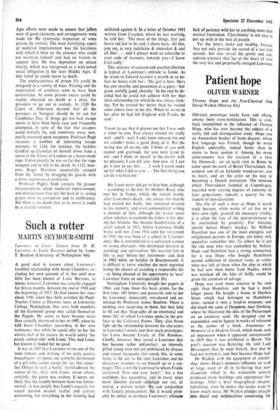Such a rotter
MARTIN SEYMOUR-SMITH
A good deal is known about Lawrence's troubled relationship with Jessie Chambers, in- cluding her own account of it; but until now little has been known of Louie Burrows, to whom, however, Lawrence was actually engaged for fifteen months, between the end of 1910 and the beginning of 1912. He had known her since about 1900, when they both attended the Pupil- Teacher Centre at Ilkeston; later, at University College, Nottingham, they were both members of the Eastwood group who called themselves the Pagans. He seems to have become more than casually interested in her in 1907, when he told• Jessie Chambers (according to, her own testimony) that while he could- offer to her the artistic half of his nature, he would satisfy 'the purely animal side' with Louie. This, had Louie but known it, boded her no good.
It was in 1907 that Lawrence wrote one of the most famous and striking of his- eatly. poems, Snapdragon; its theme, the symbolic 'ffivishment of a girl who cannot accept the 'joy that under- lies/Defeat in such a battle,' foreshadowed the course of his affair with Louie, about whom, certainly, the poem was written. It -seems un- likely that the trouble between them was funda- mental: it was simply that Louie's capacity for sexual passion needed tactful and patient awakening, for everything in her training had militated against it. In a letter of October 1911 written from Croydon, where he was working, he told her: 'The most of the things, that just heave red hot to be said, I shove back. All this, you see, is very indelicate & immodest & and all that . and I always want to subscribe to your code of manners, towards you—I know I fail sadly.'
This mixture of sarcasm and puzzled affection is typical of Lawrence's attitude to Louie. As he wrote to Edward Garnett a month or so be- fore he broke with her: 'My girl is here. She's big and swarthy and passionate as a gipsy—but good, awfully good, churchy.' In the end he de- cided that he could not achieve with her that ideal relationship for which he was always look- ing. Yet-he treated her better than he treated some others later in his life. When he wrote to her after he had left England with Frieda, he said: '1 want to say that it grieves me that I was such a rotter to you. You always treated me really well—and I—well, I only knew towards the end we couldn't make a good thing of it. But the wrong was all on my side. I think of yott with respect and gratitude, for you were 'good to me—and I think of myself in the matter with no pleasure, I can tell you. And now all I can do is just to say this . . . I wish I could make up for what I did to you ... The best thing you can do is to hate me.'
But Louie never did get to hate him, although —according to the late Sir Herbert Read, who met her in Vence, which she visited shortly after Lawrence's death—she always felt that he had treated her badly. She remained devoted to his memory, and even contemplated writing a memoir of him, although she would never allow scholars to examine his letters to her dur- ing her lifetime. She became headmistress of a small school in 1911, before Lawrence finally broke with her; from 1914 until her retirement in 1941 she was head of a school in Leicester- shire. She is remembered as a cultivated woman of strong character, who developed interests in astrology and spiritualism. She married late in
life—a year before her retirement--and died in 1962 while on holiday in Bournemouth. It
is difficult to know whether she most regretted losing the chance of avoiding a respectable life —or being cheated of the opportunity to 'saver Lawrence from an unrespeetable life.
Nottingham University bought her papers in 1966, and from them this book prints, for the first time, 165 letters and postcards sent to her by Lawrence, impeccably introduced and an- notated by Professor James Boulton. There is nothing very surprising in them, but they -help to fill out that 'biography of an emotional and inner life' of which Lawrence spoke in the pre- face to his Collected Poems. They also- throw light on the relationship between the characters in Lawrence's novels-and-their main prototypes; for Louie became 'Ursula of The Rainbow. Chiefly, however, they reveal a Lawrence that has become rather unfamiliar: an intensely gifted young man not yet embittered by disease and 'sexual incapacity (for surely this, in some form, is the key to the later Lawrence and -his disastrous attempts to set himself up as a sex- mage). This is not the Lawrence to whom Frieda exclaimed 'You and your hates!,' but a less confident, less egocentric, and in many ways more likeable person—.-alglirugh not yet, of course, a mature writer. We can sympathise with Louie's predicament; but it would prob. ably be unfair to attribute Lawrence's ultimata
lack of patience with her to anything more than normal frustration. `Churchiness' is not easy to put up with in the best of people.
Yet the letters make sad reading, because they not only provide the record of a sad little episode, but also reveal the gentle and con- siderate creature that lay at the heart of even the very late and perpetually enraged Lawrence.


































 Previous page
Previous page